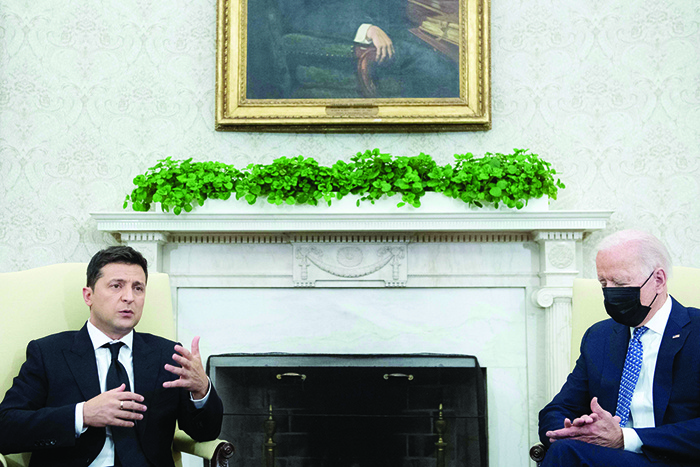 WASHINGTON: US President Joe Biden listens while Ukraine’s President Volodymyr Zelensky speaks to the press before a meeting in the Oval Office of the White House September 1, 2021, in Washington, DC. — AFP
WASHINGTON: US President Joe Biden listens while Ukraine’s President Volodymyr Zelensky speaks to the press before a meeting in the Oval Office of the White House September 1, 2021, in Washington, DC. — AFPWASHINGTON: President Joe Biden assured Ukraine’s leader Volodymyr Zelensky on Wednesday that the United States opposes “Russian aggression” but he showed no sign of moving on requests to open NATO to the eastern European country. “The United States remains firmly committed to Ukraine’s sovereignty and territorial integrity in the face of Russian aggression and our support for Ukraine’s Euro-Atlantic aspirations,” Biden told the Ukrainian president in the Oval Office. Zelensky, who spent Tuesday at the Pentagon pressing for military assistance to combat Russia and Russian-backed separatists, is only the second European leader to get a White House meeting so far under Biden.
The coronavirus pandemic and a hectic first seven months of the administration mean Biden has had few foreign visitors. Even Zelensky’s meeting was delayed by two days due to the tense US withdrawal from Afghanistan, completed Monday. “President Zelensky and Ukraine have gotten as much, if not more, attention from this administration than any other European country,” a senior Biden administration official told reporters, asking not to be identified.
The White House visit was undoubtedly a triumph for Zelensky, who has been trying to line one up since he took office in 2019. A former comedian virtually unknown in the West, he found himself caught in a US domestic political firestorm when then-president Donald Trump asked him to launch a spurious corruption probe into Biden’s family ahead of the 2020 US presidential election. Accusations that Trump tried to block military aid to Ukraine to pressure Zelensky sparked an impeachment of the Republican.
Plea to join NATO
The hard reality facing Zelensky, however, is that his most ambitious goals for the US-Ukrainian relationship face slow going. In the Oval Office, he raised his government’s top strategic dream-membership in the NATO military alliance. “I would like to discuss with President Biden his vision, his government’s vision of Ukraine’s chances to join NATO and the timeframe,” he said.
But Biden has made clear he considers Ukraine far from ready to join-and the United States far from ready to step over what Russia sees as a bright red line. White House Press Secretary Jen Psaki insisted the White House continues “to support and we continue to call for ensuring that NATO’s door remains open to aspirants.” However, she then enumerated the daunting conditions for membership: rule of law reforms, defense sector modernization and a vibrant economy.
“There are steps that Ukraine needs to take. They’re very familiar with these,” she said. Zelensky has also been hugely disappointed by Biden’s decision to waive US sanctions intended to block completion of Russian state energy behemoth Gazprom’s Nord Stream 2 natural gas pipeline. But Zelensky later told reporters Biden had assured him the United States would impose sanctions on the pipeline if there were “violations” from Russia after the start of Nord Stream 2 operations that would create problems for Ukraine’s energy security. The White House says it remains concerned by the geostrategic implications of the pipeline, which will funnel energy directly from Russia to Germany, bypassing the previous route through Ukraine. However, Biden argued the project had already been nearly finished by the time he got into office and could not be stopped. The limitations on the relationship were neatly illustrated in June, when Zelensky’s bid to meet with Biden first before the US leader held a June summit with Russian President Vladimir Putin in Geneva was rejected.
Focusing on more concrete, near-term deliverables, Zelensky met Tuesday with Secretary of Defense Lloyd Austin to request help in Ukraine’s unequal struggle with Russia. Their talks came the day after the last US troops left Afghanistan, ending America’s longest-ever war after the nearly 20-year-old US-backed Afghan government collapsed to the Taleban. Austin told Zelensky that the United States is committed to demanding that Russia “stop perpetuating the conflict” in eastern Ukraine and leave Crimea, the peninsula Russia seized from Ukraine in 2014. He highlighted a new $60 million package for Ukraine that includes Javelin anti-armor systems.
He said the United States has committed $2.5 billion for Ukraine’s defense since 2014, when Russia intervened as Ukraine turned increasingly towards the West. — AFP









